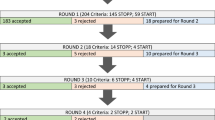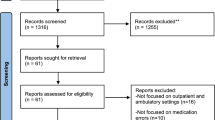Abstract
Background Stroke patients have low medication adherence after discharge, which leads to a high recurrence rate and poor disease control. Various strategies have been explored to enhance medication adherence in this patient population. Aim To evaluate the effects of mobile health (mHealth) and telehealth technology on medication adherence in stroke patients. Method All English studies that met the inclusion criteria published before September 2021 were obtained from PubMed, EMBASE, Web of Science, and Cochrane Library. Two researchers independently screened articles, extracted data, and evaluated the quality of the included studies. All articles were about randomized controlled trials. Medication adherence was used as the outcome index of this review. Random or fixed-effect models were used in statistical methods. I2 statistics were used to evaluate heterogeneity. Results A total of ten studies met the inclusion criteria, covering 2151 stroke patients. Compared with the Usual Care group, the medication adherence scores of the mHealth technology group were better (standard mean deviation 0.67, 95% confidence interval, CI [0.49, 0.85], P < 0.001). The medication adherence ratio of the mHealth technology group was higher (odds ratio, OR, 2.81, 95% CI [1.35, 5.85], P = 0.006). Subgroup analysis showed that application and messaging interventions were more effective than the telephone call intervention (OR 4.05, 95% CI [2.10, 7.80], P < 0.001). The shorter the interval of the intervention, the better the medication adherence of patients (OR 4.24, 95% CI [2.30, 7.81], P < 0.001). Conclusion Compared with Usual Care, mHealth can effectively improve the medication adherence of stroke patients.





Similar content being viewed by others
Availability of data and materials
All the data were extracted from the included studies, and they were true and valid.
Code availability
Not applicable.
References
Miller C, Behrouz R. Impact of Infection on Stroke Morbidity and Outcomes. Curr Neurol Neurosci Rep. 2016;16(9):83.
Shim R, Wong C. Ischemia, Immunosuppression and Infection-Tackling the Predicaments of Post-Stroke Complications. Int J Mol Sci. 2016;17(1):64.
Appalasamy JR, Tha KK, Quek KF, et al. The effectiveness of culturally tailo-red video narratives on medication understanding and use self-efficacy among stroke patients: a randomized controlled trial study protocol. Medicine. 2018;97(22):e10876.
De Geest S, Sabate É. Adherence to long-term therapies: evidence for action. Eur J Cardiovasc Nurs. 2003;2(4):323. https://doi.org/10.1016/S1474-5151(03)00091-4.
Bushnell CD, Olson DM, Zhao X, et al. Secondary preventive medication persistence and adherence 1 year after stroke. Neurology. 2011;77:1182–90.
Nayeri ND, Mohammadi S, Arazi T. Examining the level of adherence of therapeutic regime by the family caregivers of stroke patients. Canadian Journal on Medicine. 2011;2(4):84–98.
Heidenreich P. Patient adherence: the next frontier in quality improvement. Am J Med. 2004;117(2):130–2.
Prell T, Grosskreutz J, Mendorf S, et al. Clusters of non-adherence to medication in neurological patients. Res Soc Adm Pharm. 2019;15(12):1419–24.
Ni Z, Dardas L, Wu B, et al. Cardioprotective medication adherence among patients with coronary heart disease in China: a systematic review. Heart Asia. 2019;11(2):e011173.
Labrique AB, Vasudevan L, Kochi E, et al. mHealth innovations as health system strengthening tools: 12 common applications and a visual framework. Global Health Sci Pract. 2013;1(2):160–71.
Hamine S, Gerth-Guyette E, Faulx D, et al. Impact of mHealth chronic disease management on treatment adherence and patient outcomes: a systematic review. J Med Internet Res. 2015;17(2):e52.
Beratarrechea A, Lee AG, Willner JM, et al. The impact of mobile health interventions on chronic disease outcomes in developing countries: a systematic review. Telemed e-Health. 2014;20(1):75–82.
Peiris D, Praveen D, Johnson C, et al. Use of mHealth systems and tools for noncommunicable diseases in low-and middle-income countries: a systematic review. J Cardiovasc Transl Res. 2014;7(8):677–91.
Beratarrechea A, Moyano D, Irazola V, et al. mHealth interventions to counter noncommunicable diseases in developing countries: still an uncertain promise. Cardiol Clin. 2017;35(1):13–30.
Gandhi S, Chen S, Hong L, et al. Effect of mobile health interventions on the secondary prevention of cardiovascular disease: systematic review and meta-analysis. Can J Cardiol. 2017;33(2):219–31.
Cicolini G, Simonetti V, Comparcini D, et al. Efficacy of a nurse-led email reminder program for cardiovascular prevention risk reduction in hypertensive patients: a randomized controlled trial. Int J Nurs Stud. 2014;51:833–43.
Chamany S, Walker EA, Schechter CB, et al. Telephone intervention to improve diabetes control: a randomized trial in the New York City A1c registry. Am J Prev Med. 2015;49:832–41.
Higgins JPT, Green S. Cochrane handbook for systematic reviews of interventions version 5.1.0. The Cochrane Collaboration 2011. https://training.cochrane.org/handbook.
Kamal AK, Shaikh Q, Pasha O, et al. A randomized controlled behavioral intervention trial to improve medication adherence in adult stroke patients with prescription tailored Short Messaging Service (SMS)-SMS4Stroke study. BMC Neurol. 2015;15:212.
Wan LH, Zhang XP, Mo MM, et al. Effectiveness of goal-setting telephone follow-up on health behaviors of patients with ischemic stroke: a randomized controlled trial. J Stroke Cerebrovasc Dis. 2016;25:2259–70.
Sarfo FS, Treiber F, Gebregziabher M, et al. Phone-based intervention for blood pressure control among Ghanaian stroke survivors: a pilot randomized controlled trial. Int J Stroke. 2019;14:630–8.
Wan LH, Zhang XP, You LM, et al. The efficacy of a comprehensive reminder system to improve health behaviors and blood pressure control in hypertensive ischemic stroke patients: a randomized controlled trial. J Cardiovasc Nurs. 2018;33:509–17.
Hedegaard U, Kjeldsen LJ, Pottegård A, et al. Multifaceted intervention including motivational interviewing to support medication adherence after stroke/transient ischemic attack: a randomized trial. Cerebrovasc Dis Extra. 2014;4:221–34.
Nayeri ND, Mohammadi S, Razi SP, et al. Investigating the effects of a family-centered care program on stroke patients’ adherence to their therapeutic regimens. Contemp Nurse. 2014;47:88–96.
Tzikas A, Samaras A, Kartas A, et al. Motivational Interviewing to Support Oral AntiCoagulation adherence in patients with non-valvular Atrial Fibrillation (MISOAC-AF): a randomized clinical trial. Eur Heart J Cardiovasc Pharmacother. 2021;7:f63–71.
Wald DS, Bestwick JP, Raiman L, et al. Randomised trial of text messaging on adherence to cardiovascular preventive treatment (INTERACT trial). PLoS ONE. 2014;9:e114268.
Labovitz DL, Shafner L, Reyes Gil M, et al. Using artificial intelligence to reduce the risk of nonadherence in patients on anticoagulation therapy. Stroke. 2017;48:1416–9.
Rattanayotin J, Vanijja V. Designing and developing android application for medication reminder to improve treatment efficiency of stroke patient. KnE Soc Sci. 2017;3(1):143–56.
U.S. Smartphone Use in 2015. Pew Research Centre, Washington D.C. http://www.pewinternet.org/2015/04/01/us-smartphone-use-in-2015/
Wan LH, Zhao J, Zhang XP, et al. Stroke prevention knowledge and prestroke health behaviors among hypertensive stroke patients in mainland China. J Cardiovasc Nurs. 2014;29:E1–9.
Wan LH, Deng SF, Zhang XP, et al. Health knowledge and behaviors among hypertensive stroke patients in different stages. Chin J Nurs. 2013;48:428–31.
Wan LH, Zhang XP, Hong H, et al. Study on health behaviors of stroke patients and its influencing factors. Chin Nurs Res. 2010;24:1–4.
Haug S, Meyer C, Dymalski A, et al. Efficacy of a text messaging(SMS) based smoking cessation intervention for adolescents and young adults: study protocol of a cluster randomised controlled trial. BMC Public Health. 2012;12(1):51.
Kim HS, Kim NC, Ahn SH. Impact of a nurse short message service intervention for patients with diabetes. J Nurs Care Qual. 2006;21(3):266–71.
Strandbygaard U, Thomsen SF, Backer V. A daily SMS reminder increases adherence to asthma treatment: a three-month follow-up study. Respir Med. 2010;104(2):166–71.
Bauer S, de Niet J, Timman R, Kordy H. Enhancement of care through self-monitoring and tailored feedback via text messaging and their use in the treatment of childhood overweight. Patient Educ Couns. 2010;79(3):315–9.
Mbuagbaw L, Thabane L, Ongolo-Zogo P, et al. The Cameroon Mobile Phone SMS (CAMPS) trial: a randomized trial of text messaging versus usual care for adherence to antiretroviral therapy. PLoS ONE. 2012;7(12):e46909.
Prabhakaran L, Chee WY, Chua KC, et al. The use of text messaging to improve asthma control: a pilot study using the mobile phone short messaging service (SMS). J Telemed Telecare. 2010;16(5):286–90.
de Jongh T, Gurol-Urganci I, Vodopivec-Jamsek V et al. Mobile phone messaging telemedicine for facilitating self-management of long-term illnesses. Cochrane Libr 2008;(4).
Free C, Knight R, Robertson S, et al. Smoking cessation support delivered via mobile phone text messaging (txt2stop): a single-blind, randomised trial. Lancet. 2011;378(9785):49–55.
Free C, Phillips G, Watson L, et al. The effectiveness of mobile-health technologies to improve health care service delivery processes: a systematic review and meta-analysis. PLoS Med. 2013;10(1):e1001363.
Zhang Y, Fan D, Ji H, et al. Correction: treatment adherence and secondary prevention of ischemic stroke among discharged patients using mobile phone- and wechat-based improvement services: cohort study. JMIR Mhealth Uhealth. 2020;84(4):e19454.
Adie K, James MA. Does telephone follow-up improve blood pressure after minor stroke or TIA? Age Ageing. 2010;39:598–603.
Leistner S, Michelson G, Laumeier I, et al. Intensified secondary prevention intending a reduction of recurrent events in TIA and minor stroke patients (INSPiRE-TMS): a protocol for a randomised controlled trial. BMC Neurol. 2013;13:11.
Zhang XP, Pan JH, Wan LH, et al. Factors influencing health behaviour, blood pressure control, and disability in hypertensive ischaemic stroke patients after a comprehensive reminder intervention. J Adv Nurs. 2020;76(6):1384–93.
Xu G, Liu X, Wu W, et al. Recurrence after ischemic stroke in chinese patients: impact of uncontrolled modifiable risk factors. Cerebrovasc Dis. 2007;23(2–3):117–20.
Em S, Bozkurt M, Caglayan M, et al. Psychological health of caregivers and association with functional status of stroke patients. Top Stroke Rehabil. 2017;24(5):323–9.
Choudhry NK, Krumme AA, Ercole PM, et al. Effect of reminder devices on medication adherence: the REMIND randomized clinical trial. JAMA Intern Med. 2017;177(5):624–31.
Vervloet M, Linn AJ, van Weert JCM, et al. The effectiveness of interventions using electronic reminders to improve adherence to chronic medication: a systematic review of the literature. J Am Med Inform Assoc. 2012;19(5):696–704.
Hawkes AL, Chambers SK, Pakenham KI, et al. Effects of a telephone-delivered multiple health behavior change intervention (CanChange) on health and behavioral outcomes in survivors of colorectal cancer: a randomized controlled trial. J Clin Oncol. 2013;31:2313–21.
Weeda ER, Muraoka AK, Brock MD, et al. Medication adherence to injectable glucagon-like peptide-1 (GLP-1) receptor agonists dosed once weekly vs once daily in patients with type 2 diabetes: a meta-analysis. Int J Clin Pract. 2021;56:e14060.
Waterman AD, Milligan PE, Banet GA, et al. Establishing and running an effective telephone-based anticoagulation service. J Vasc Nurs. 2001;19(4):126–33.
Acknowledgements
ZZW and WTT initiated the study. ZZW, WTT, and LMN performed data extraction and analyses and drafted the first version of the manuscript. WTT, LMN, and ZJH critically reviewed the manuscript and revised it. All authors made a substantial contribution to the concept and design of the study, interpreted the data, and reviewed the manuscript.
Funding
This study was funded by the Natural Science Foundation of Fujian Province, China (2018Y0037), and the Fujian Provincial Health Technology Project, China (2019-CX-19).
Author information
Authors and Affiliations
Corresponding author
Ethics declarations
Conflicts of interest
The authors declare no conflict of interest.
Ethics approval
Not applicable.
Consent to participate
Not applicable.
Consent for publication
All the authors agreed to publish.
Additional information
Publisher's Note
Springer Nature remains neutral with regard to jurisdictional claims in published maps and institutional affiliations.
Rights and permissions
About this article
Cite this article
Zeng, Z., Wu, T., Lv, M. et al. Impact of mobile health and telehealth technology on medication adherence of stroke patients: a systematic review and meta-analysis of randomized controlled trials. Int J Clin Pharm 44, 4–14 (2022). https://doi.org/10.1007/s11096-021-01351-x
Received:
Accepted:
Published:
Issue Date:
DOI: https://doi.org/10.1007/s11096-021-01351-x




